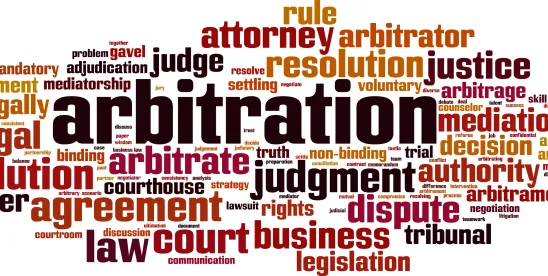Arbitration provisions are a cornerstone of dispute-resolution strategy. As the Appellate Division recently made clear in Hopkins v. LVNV Funding, LLC, however, the right to arbitrate is not self-executing—and can be forfeited through strategic delay or active participation in litigation. A party that eschews arbitration in favor of judicial process may find those rights extinguished when invoked later. The decision demonstrates that arbitration rights are preserved not merely by contract but by conduct consistent with their enforcement. Put simply, a contractual right to arbitrate means little if a party’s litigation conduct signals abandonment rather than preservation.
In response to LVNV Funding, LLC’s (“LVNV”) complaint alleging that it had defaulted on its account with Credit One Bank, N.A., incurring $746.71 in debt, Randy Hopkins (“Hopkins”) filed an answer and “class action counterclaim” in May 2022 against several LVNV-affiliated debt purchasers and collectors (“Defendants”). Hopkins v. LVNV Funding, LLC, 481 N.J. Super. 49, 56 (App. Div. 2025). Hopkins alleged that Defendants violated the New Jersey Consumer Finance Licensing Act and the Consumer Fraud Act by attempting to collect consumer debts without the requisite state licenses. Id. at 57. Though represented by counsel, Defendants waited almost sixteen months before moving to compel arbitration. Id. at 64. During that time, they filed a motion to dismiss which the trial court granted in part, resulting in the dismissal of Hopkins’s unjust enrichment claim. Id. at 58. When Defendants ultimately filed an answer to Hopkins’s remaining claims, not only had they failed to assert arbitration as an affirmative defense, id. at 65, but their Rule 4:5-1(b)(2) certifications expressly disclaimed any pending or contemplated arbitration, id. at 58.
Only after Hopkins moved to compel their long-overdue discovery responses, did Defendants finally invoke the arbitration clause and move to compel arbitration. Id. at 59. The trial court granted the motion to compel arbitration, reasoning that the parties had not engaged in sufficiently “prolonged litigation” to support a finding of waiver. Id. In doing so, however, the court focused primarily on the passage of time. It gave little weight to Defendants’ litigation conduct, including their earlier motion to dismiss, omission of arbitration from their pleadings, and affirmative disclaimer of arbitration in the Rule 4:5-1 certifications accompanying the pleadings. Ibid. The Appellate Division reversed and remanded, holding that the trial court failed to conduct the totality-of-the-circumstances analysis required under Cole v. Jersey City Medical Center, 215 N.J. 265, 280–81 (2013). Hopkins, 481 N.J. Super. at 59.
Applying Cole, the Appellate Division considered seven non-exclusive factors to determine whether Defendants had waived their right to arbitrate. These include:
(1) the delay in making the arbitration request; (2) the filing of any motions, particularly dispositive motions, and their outcomes; (3) whether the delay in seeking arbitration was part of the party's litigation strategy; (4) the extent of discovery conducted; (5) whether the party raised the arbitration issue in its pleadings, particularly as an affirmative defense, or provided other notification of its intent to seek arbitration; (6) the proximity of the date on which the party sought arbitration to the date of trial; and (7) the resulting prejudice suffered by the other party, if any.
[Cole, 215 N.J. at 280-81.]
In analyzing all of the above factors, the court first found that the delay was substantial. Defendants waited nearly sixteen months to raise arbitration, a period the appellate court found particularly unreasonable given that they were represented by counsel and had actively litigated the case. Hopkins, 481 N.J. Super. at 64. Second, the motion practice supported waiver. Defendants filed a dispositive motion to dismiss and secured dismissal of a claim, which signaled submission to the trial court’s adjudicative authority. Ibid. Third, the appellate court found the timing of the arbitration demand to be strategic, noting that Defendants sought arbitration only after gaining partial dismissal and when discovery pressure mounted. Ibid. Fourth, although Defendants had not served discovery, they failed to respond to Hopkins’s discovery requests and filed for arbitration two days after Hopkins moved to compel those responses. Id. at 64-65. Fifth, Defendants’ failure to raise arbitration in their pleadings—combined with express representations in their Rule 4:5-1(b)(2) certifications that no arbitration was pending or contemplated—weighed heavily in favor of a finding of waiver. Id. at 65. Sixth, the proximity to trial weighed against a finding of waiver, as no trial date had been set. Ibid. Seventh, the appellate court found prejudice based on Hopkins’s investment of time and resources in litigating the matter and the fact that a claim (unjust enrichment) had already been dismissed through motion practice. Id. at 66. The Appellate Division concluded that considering the totality of the circumstances, Defendants’ conduct was inconsistent with the right and that the “purported right” had therefore been waived. Ibid.
Hopkins reinforces the importance of asserting arbitration rights early, clearly, and consistently. Parties wishing to preserve arbitration should assert their right to the dispute resolution mechanism at the outset of litigation—typically in a pre-answer motion to dismiss and to compel arbitration or in an answer. If that motion is denied, it is subject to immediate appellate review pursuant Rule 2:2-3, which treats such orders as final for appeal purposes.
If an answer is filed, the Rule 4:5-1(b)(2) certification must invoke the possibility of arbitration. Disclaiming any pending or contemplated arbitration in a Rule 4:5-1(b)(2) certification can later be used as evidence of waiver. Although attorneys often treat this certification as routine, Hopkins serves as a reminder that courts will hold parties to the representations made pursuant to Rule 4:5-1—especially where subsequent conduct reinforces the appearance that arbitration is off the table. The Appellate Division also emphasized that Rule 4:5-1 certifications carry a continuing obligation to amend if arbitration later becomes a viable or intended course of action. Id. at 65. A failure to amend the certification in a timely manner—especially when coupled with dispositive motion practice, participation in discovery, or delay until adverse rulings loom—can weigh heavily in a court’s waiver analysis.
To avoid these pitfalls, attorneys should flag and assess arbitration provisions at the outset of a case. Strategic inconsistency is risky and may result in the permanent forfeiture of a bargained-for right. Ultimately, Hopkins sends a cautionary message to all litigants who intend to rely on arbitration clauses—whether in low-stakes consumer matters or complex commercial disputes: courts will enforce such provisions only when parties treat arbitration as a right to be proactively preserved, not casually presumed.




 />i
/>i

